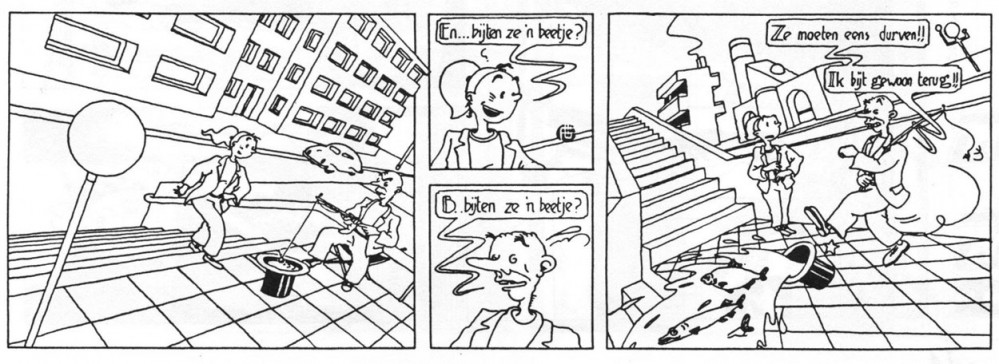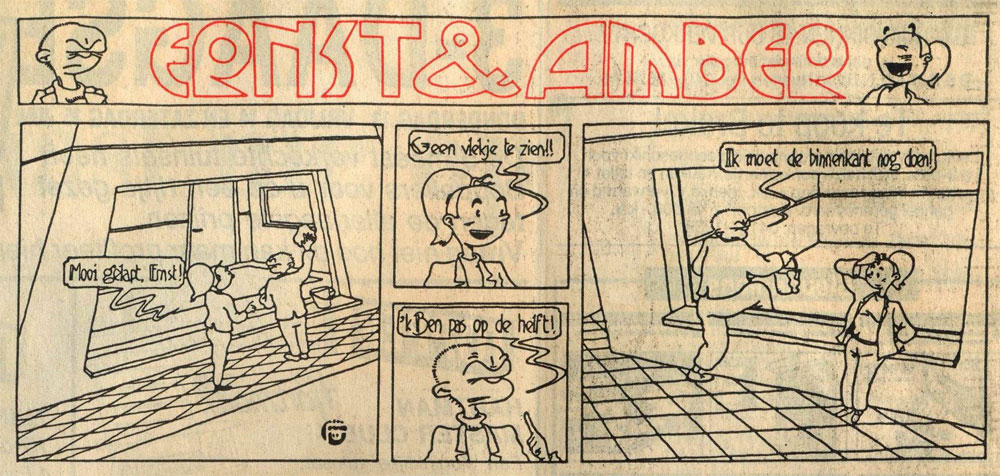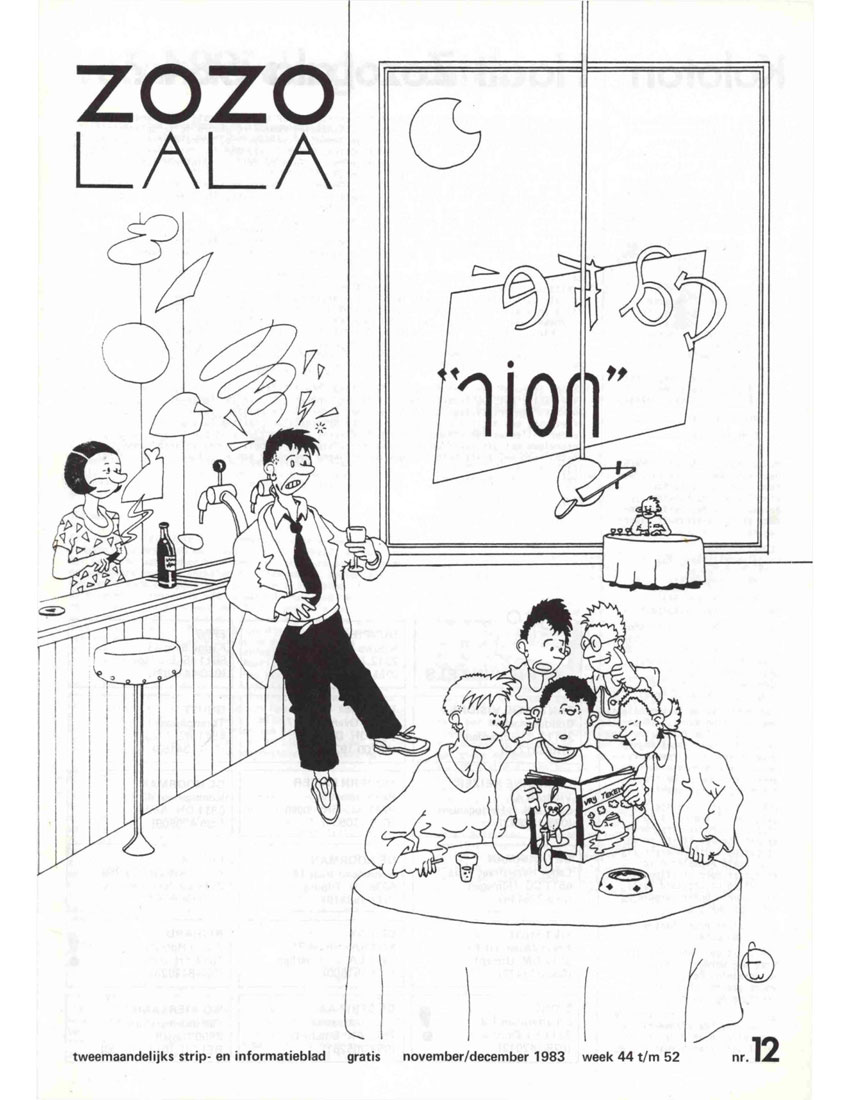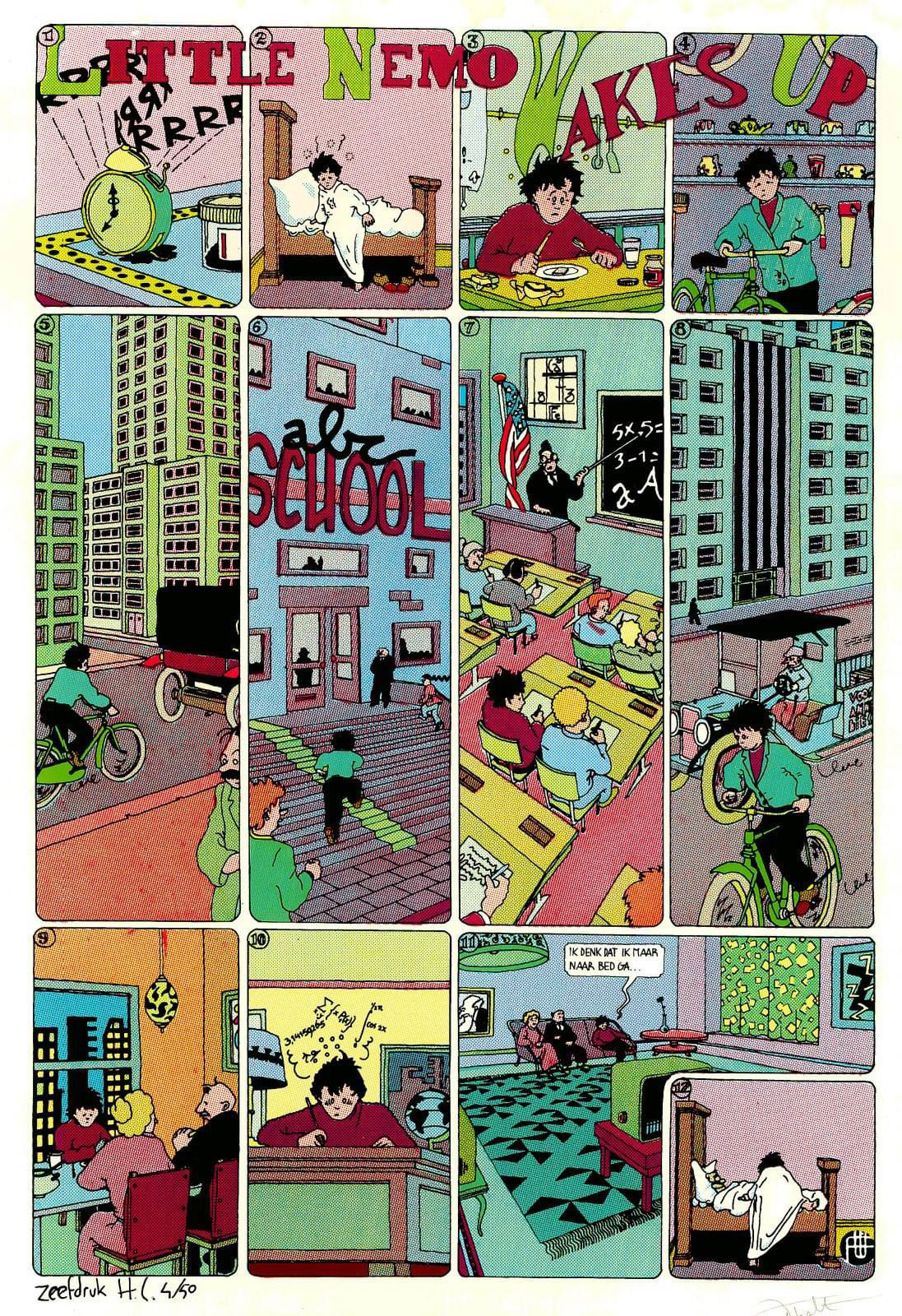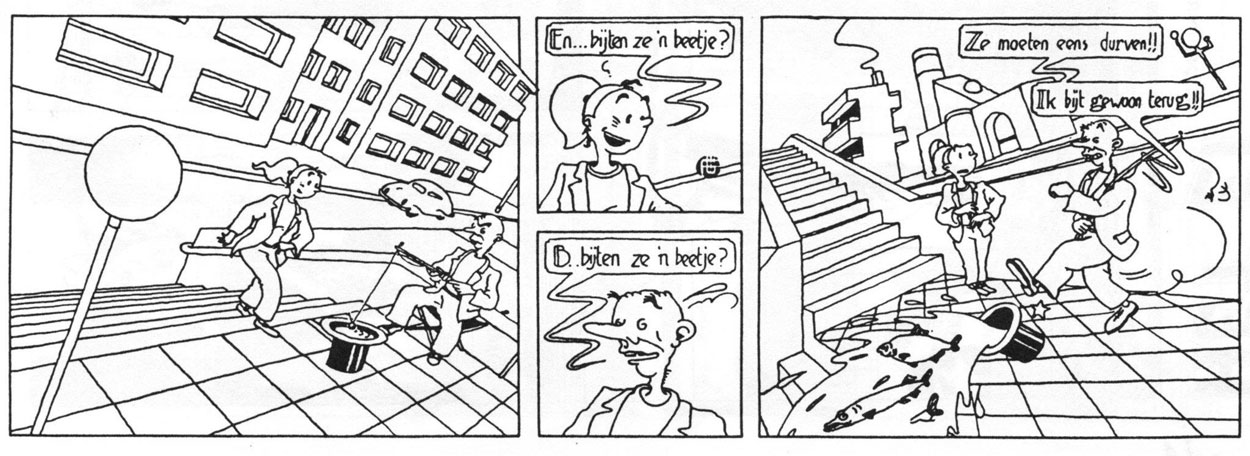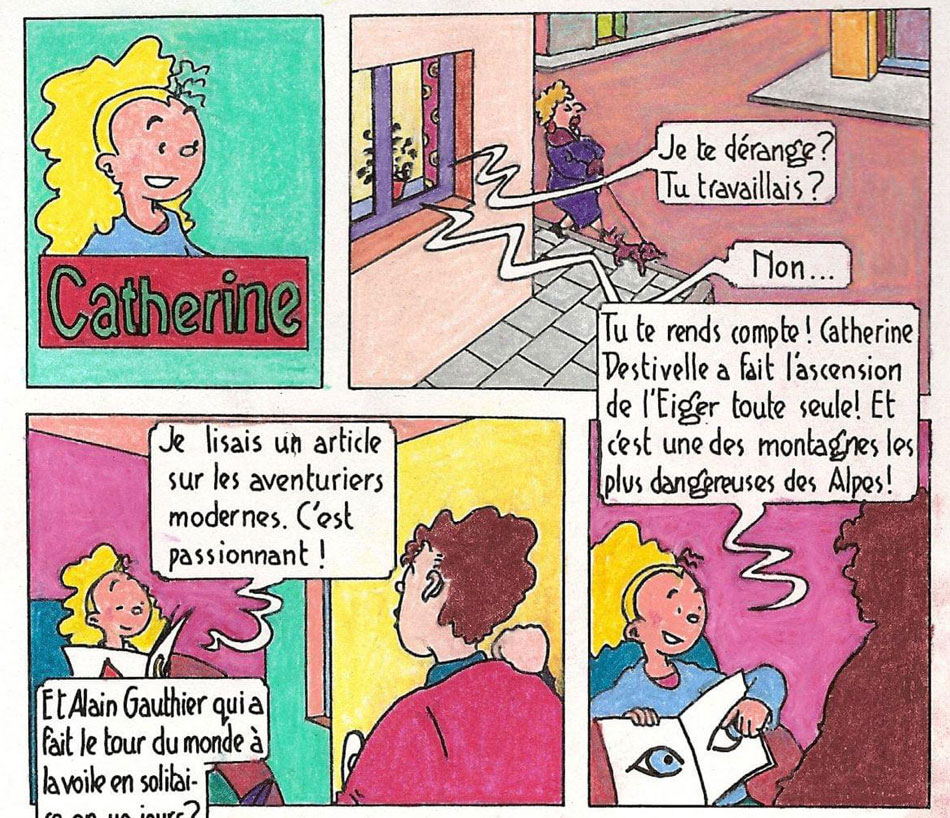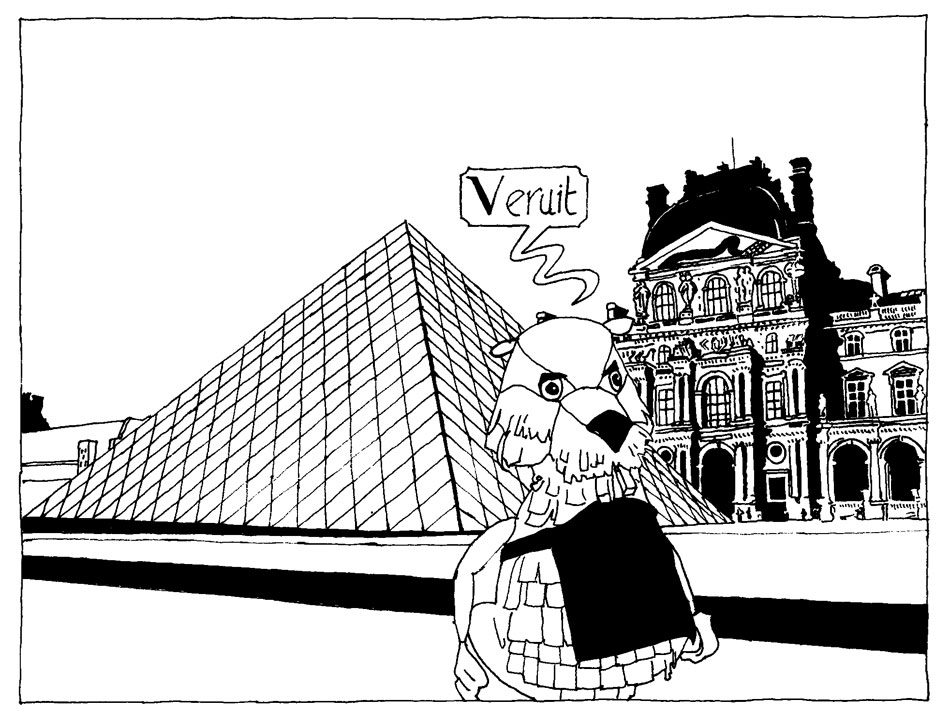'Ernst en Amber' (early 1990s). Translation: "Nice cleaning job, Ernst! Not a spot to see!!" - "I've only done half of it! I still need to do the inside!".
Frans Wentholt was a Dutch cartoonist, composer and creator of cryptograms. Early in his career, Wentholt created comics for the regional newspaper Brabants Dagblad (Ernst en Amber', 1990-1991) and for several comic-related indie magazines from the city of Nijmegen: Vrij Tekenen, Zozolala and Iris. Later in life, he gained notoriety as a composer of piano nocturnes and film music, and additionally developed the concept of the "cryptographic".
Early life and work
Frans Wentholt was born in 1958 in the city of Eindhoven, where he also studied Dutch language at the Catholic University. In 1982, he graduated with a Doctoral thesis on how male and female roles are depicted in comics. Inspired by the alliterative titles of Willy Vandersteen's 'Suske en Wiske' comics, he gave it the title 'De Roestige Rolpatronen' ("The Rusty Role Patterns"). Around the same time, Wentholt was also involved in the launch of Stichting Uitgeverij Beeldspraak, along with Erik Steffens, Hans Kuitert, Erik Zegveld and Rik Meier. This idealistic publishing initiative intended to print work by new comic creators, although their only known release was Berend Jan Vonk's debut comic 'Pastorale 83' (1982).
Cover for Zozolala #12 (November/December 1983).
Comics
During his student years, Wentholt drew comics and cartoons for the local Nijmegen comic magazine Vrij Tekenen (1982-1984), published independently by De Haktol. One of his contributions was a comic story based on the short story 'De Achtste Geschiedenis van Gezag' by Dutch novelist Multatuli. Among the other comic creators in Vrij Tekenen were Albo Helm, Berend Jan Vonk, Wijko Koek and Herwin Walravens. Still in 1982, Wentholt was also among the early contributors to the Nijmegen-based comic news magazine Zozolala, for which he wrote articles and created artwork. One of his notable productions for the Zozolala team was the 1984 silkscreen print 'Little Nemo Wakes Up', a tribute to Winsor McCay's classic 'Little Nemo in Slumberland' Sunday pages. Instead of the typical situation in which Nemo dreams and falls out of bed, Wentholt actually imagines what Nemo's daytime life looks like, in all of its dreary reality.
'Little Nemo Wakes Up', a homage to Winsor McCay's 'Little Nemo in Slumberland' (silkscreen, 1984).
During the 1980s, Frans Wentholt began his professional career as an illustrator for the newspaper De Volkskrant. In the early 1990s, he drew the comic gag strip 'Ernst en Amber' (1990-1991) in the regional newspaper Brabants Dagblad. The comic revolves around a young woman, Amber, and a young man named Ernst. Amber plays the straight character to Ernst's sheer comedic stupidity. 'Ernst and Amber' is additionally notable for combining Clear Line-inspired artwork with an experimental use of perspective.
Afterwards, Wentholt was part of the editorial staff of the Nijmegen indie comic magazine Iris (1991-1997), which had among its regular contributors Remco Polman, Mark Retera, Wilfred Ottenheijm, Mark Schilders, Mark Hendriks, Peter Nuyten, Herman Roozen, Maaike Hartjes and Paul Hoogma. The magazine also reprinted several of Frans Wentholt's earlier comics for Vrij Tekenen and Brabants Dagblad. During the 1990s, Wentholt also created comics and other artwork for school exercise books.
'Ernst en Amber' (early 1990s). Translation: "And do they bite?" - "B... bite? They ought to try!! I just bite them back!!".
Other activities
During his professional life, Frans Wentholt worked as a copywriter, editor and project leader for the IT service provider PinkRoccade/Getronics, and as a teacher of Dutch language at secondary education schools in Nijmegen and Arnhem. Besides through words and visual art, he also expressed himself as a composer of music. In 1988, two of his nocturnes for piano were released on CD (including the premiere of his first nocturne by Sebastiaan Oosthout). Later on, he wrote the film music for the animated short film 'Aurora' (2012) by comic creator Aimée de Jongh.
'Catherine'. Part of a comic for a school book in French (1998).
Starting in 2001, Wentholt dedicated much of his time to creating cryptogram puzzles. Innovative and experimental, he initiated alternative cryptogram concepts like the cryptograph, in which a cryptic message was hidden in a drawing, as well as the pentagram, cryptomusic and, together with Adri Altink, the rebus cryptogram. At the end of 2015, the Kurtface Foundation published a silkscreen print with a redrawn version his most famous graphic puzzle, 'Zoek de Zevende Dwerg' ("Find the Seventh Dwarf", with the Dutch word "zevende" meaning both "seventh" and "sifting").
Death
After years of ill health, both physically and mentally, Frans Wentholt died from heart disease in 2024 in his hometown Nijmegen. He was 66 years old.
Musical cryptographic by Frans Wentholt. The rebus depicts Ed Bever (the beaver from the children's TV show 'Fabeltjeskrant') standing in front of the Louvre, while saying: "Veruit!" ("By far!", but also readable as "V eruit", meaning "Remove the 'V'"). The answer to the riddle is taking the letters from the Louvre, removing the "v" and then add Ed Bever's first name "Ed", which brings the reader to rock singer "Lou Reed".


